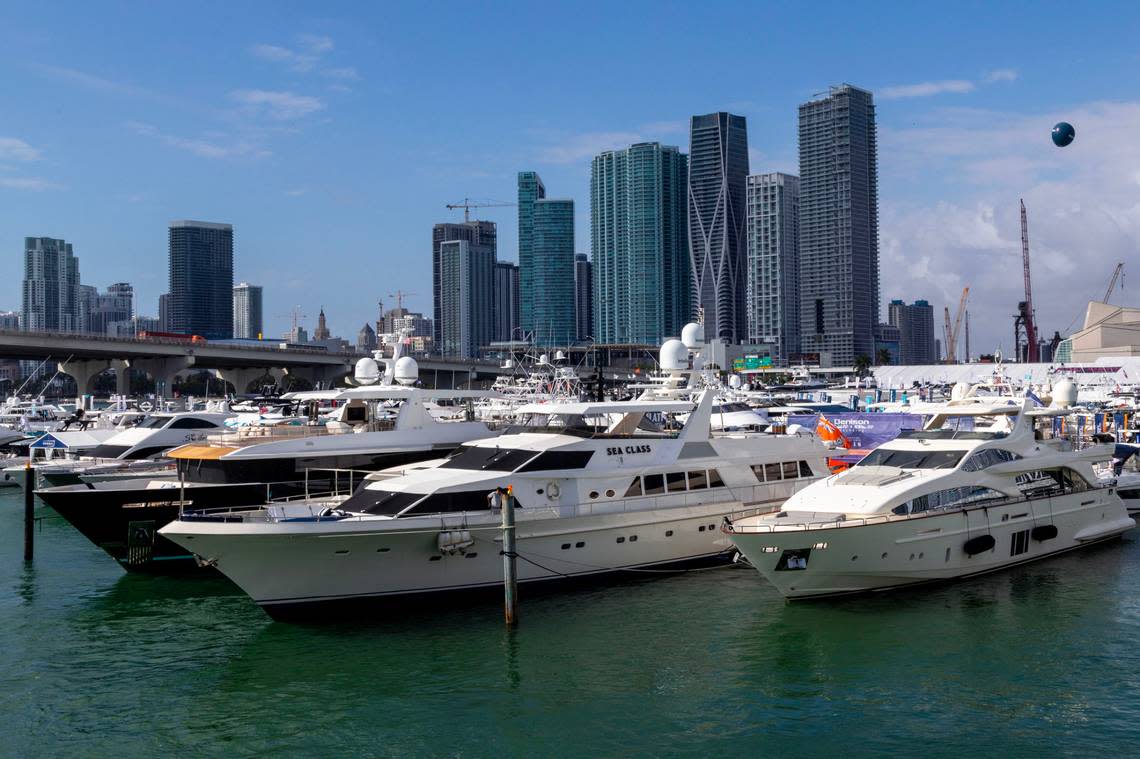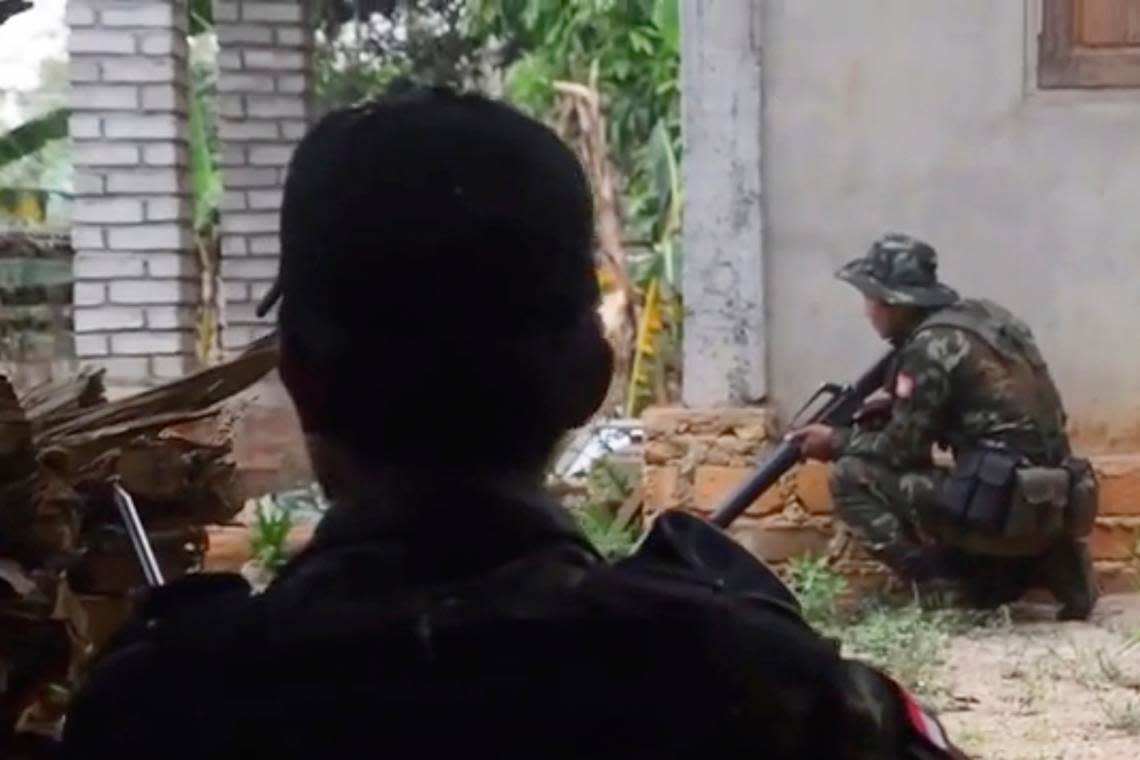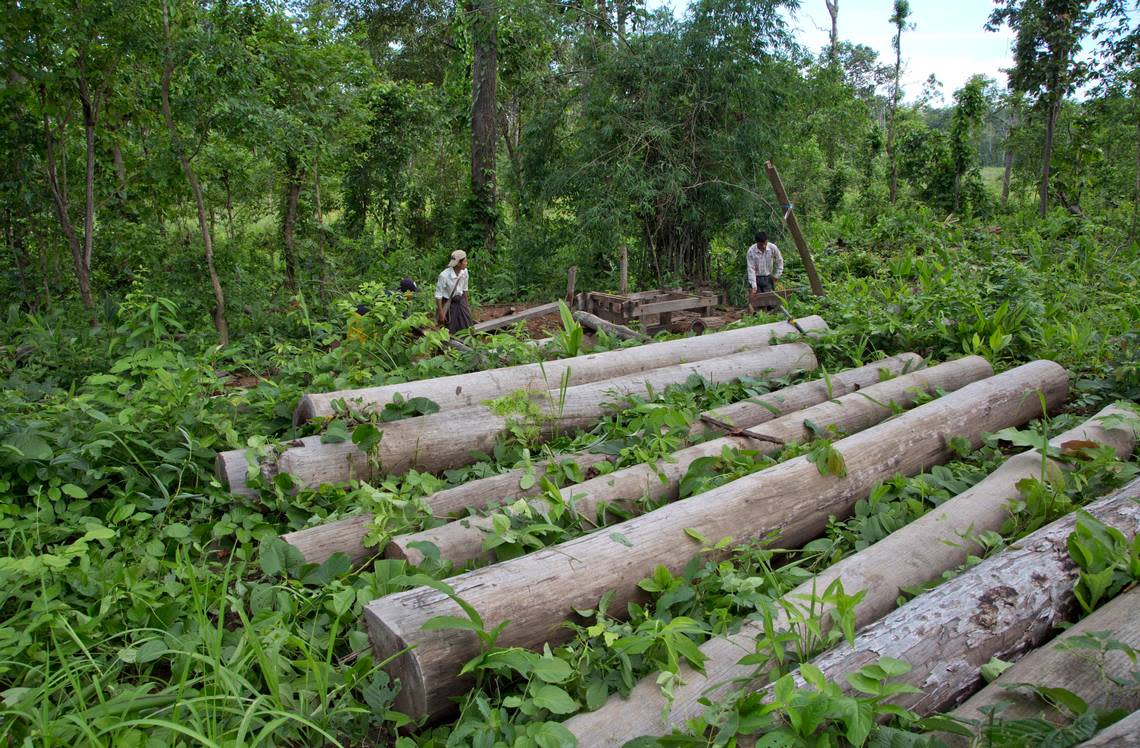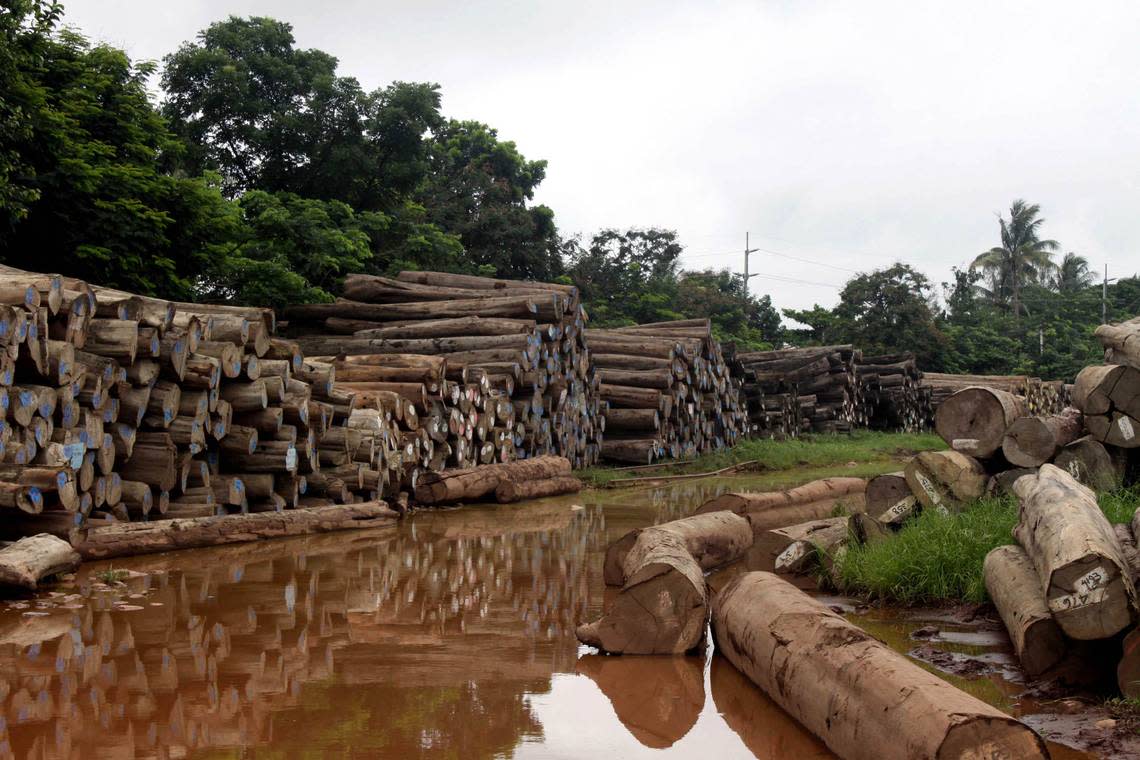How Florida wood traders navigate ban on repressive regime’s rare teak: Tree DNA tests
Florida companies Teakdecking Systems and Florida Teak imported more than half a million pounds of Burmese teak from Myanmar despite U.S. economic sanctions against the Myanma Timber Enterprise, the state firm that de facto controls the country’s timber sector. The sanctions have been in place since April 2021 and were imposed against the MTE for “the production and export of timber on behalf of the Burmese military regime” that overthrew the civilian government.
Florida Teak boasts of providing teak for the supplier to boat-making giant Viking Yachts, while Teakdecking Systems is among the largest makers of teak decks in the United States, with a client list that includes Jupiter Marine in Palmetto, German luxury yacht builder Lürssen Werft, the United Kingdom’s Pendennis Shipyard and Southern Wind Yachts in Cape Town and Genoa.
Florida Teak and Teakdecking Systems both say they have broken no law.
While they declined to provide any documentation about their supply chains or the due diligence they perform, both tout certifications from Singapore-based Double Helix Tracking Technologies, a third-party company that checks whether the sourcing of teak is clean.
The Miami Herald’s examination of how teak in Myanmar winds up in Florida despite sanctions is part of a global collaboration with the Washington, D.C.-based International Consortium of Investigative Journalists titled “Deforestation, Inc.” The project explores issues of legality in supply chains, the difficulties of enforcing trade laws and how consumers in Florida and beyond may unwittingly be financing criminal organizations or repressive regimes.
Double Helix provides what it calls supply-chain “verification.” Its Myanmar operations involve verifying the chronological paper trail that records the sequence or chain of custody for its clients’ teak shipments from the time of logging to export, the company’s CEO, Darren Thomas, said in an interview with the Miami Herald. In some cases, the company partners with scientific institutions that perform DNA tests that match the wood in the shipment to the originating tree stump.

Double Helix is still verifying shipments from Myanmar but is unable to do DNA tests anymore and business is dwindling, Thomas said. The service it offers now is to check that private traders bought their teak from Myanma Timber Enterprise prior to the sanctions and to ensure that the teak did not subsequently pass through any facility whose majority-owners were a sanctioned entity before shipping.
Trade in those would be sanctions-compliant, Thomas said, adding that the firm’s attorneys are in communication with the State and Treasury departments.
“Through that channel we were able to determine exactly how we should design this process around sanctions verification,” he said.
The Treasury and State departments did not respond to the Herald’s questions about the conversations nor did they confirm that they had happened.
The shipments Double Helix verified were “purchased from MTE or other sanctioned entities before the sanctions date” and no sanctioned entity received any financial interest after the sanctions were imposed, Thomas said.
Sanctions experts told the Herald that traders are taking a huge risk if they are importing teak from Myanmar post-sanctions, regardless of when the order was placed and how it was stored and transported.
The purchase date should not be relevant, because the sanctions regulations clearly say they apply “notwithstanding any contract entered into … before the date” of imposition, said Michael Malloy, a former sanctions expert with the Treasury Department.
The teak shipments Florida Teak and Teakdecking Systems imported post-sanctions were loaded onto ships in Myanmar only after Treasury announced the measures, according to the Herald’s analysis of import records. That is a red flag from a due diligence perspective, Malloy said, given that MTE has monopoly power over the timber industry and the official in charge of the port authority is himself also specifically sanctioned.
Darren Thomas declined to comment on any specific U.S.-bound shipment Double Helix verified since 2021, citing client confidentiality.
He said competitors are known for “routinely verifying exports of Myanmar teak, applying a much lesser degree of scrutiny than DoubleHelix.”
Pro-democracy activists like Yadanar Maung, member of Justice for Myanmar, say that teak traders are dealing in conflict timber — and that the junta, which has already killed thousands of civilians in the country, is using the revenue to finance a reign of terror.
U.S. businesses imported roughly the same amount — 3.7 million pounds — of teak directly from Myanmar as in the preceding two years, a Herald analysis of import records found. The total value of the post-sanctions imports currently stands at $25 million, a tenth of which entered through Florida.
The seeming absence of U.S. enforcement when it comes to teak imports — considered a coveted luxury item today — might be due to a lack of resources, said Cullen Hendrix of the Peterson Institute for International Economics. Hendrix specializes in customs enforcement and conflict resources.
“Enforcing complicated sanctions on products with small trade volumes — and whose consumers are highly politically influential and well-heeled — will not be an administration and therefore CBP [Customs and Border Patrol] priority,” he said.
Manny Maung of the international watchdog Human Rights Watch said countries should enforce sanctions targeting revenue streams of the junta’s officers.
“We are not seeing that kind of enforcement,” said Maung, who is from Myanmar herself. “Right now, it’s not hurting them where they care the most, which is their pockets.
“Years of impunity has allowed them [the Myanmar military] to get to this stage where they feel … they can do whatever they want, including committing abuses … that amount to crimes against humanity and acts of genocide. No military in the world should be allowed to get away with this.”

But the potential for sanctions violations is just one part of the problem, Myanmar’s environmental experts and activists told the Herald.
An insatiable demand for teak coupled with endemic corruption in the Burmese timber sector led to rapacious logging in Myanmar’s forests — among the last remaining jungles of old-growth teak. The country lost a fifth of its forests in just the two decades between 1990 and 2010, according to the United Nations.
READ MORE: Frequently asked questions about the Deforestation Inc. investigation
Since the coup, “there is no rule of law” and all conservation efforts have collapsed, affecting global climate change mitigation and biodiversity protection efforts, said a Burmese indigenous environmental activist who spoke to the Herald on condition of anonymity for fear of retaliation from the military.
“The coup in Myanmar doesn’t only impact the people of Myanmar,” she said. “It impacts the whole world.”
The devil in the details
The forestry sector in Myanmar is rife with corruption and MTE had been controlled by the military even during the country’s brief democratic period in the 2010s, making the sourcing of teak a cause for concern, even prior to the recent sanctions. Businesses are required to perform due diligence on their suppliers to comply with the Lacey Act, a U.S. federal law that, among other things, prohibits trade in plant products if it violates laws in its place of origin, even if that is another country.
Companies like Teakdecking Systems and Florida Teak have been using Double Helix’s verification reports to meet their due diligence requirements since before the sanctions, they say.
“These documents are a must,” said Peter Kajanoja, Florida Teak’s proprietor. “The requirements for import with these verifications are very complex and thorough.”
Double Helix has been the subject of glowing media stories in the past decade, and Thomas and his colleagues have co-authored around a dozen academic articles on their method, including one article with a U.S. Agriculture Department expert. Double Helix also helped the USDA convict illegal loggers in Washington state in 2013.

The expert group of the European Union Timber Regulation, which decides on a stringent set of rules companies must follow to import timber into the E.U., has repeatedly held that Double Helix’s services are “not adequate mitigation measures” and do not guarantee independent verifiability since the entire system in Myanmar is corrupt — rulings that Thomas dismisses as opaque and calls a “huge challenge for importers.”
The E.U. authorities’ position is that “it doesn’t matter what piece of documentation you have, you cannot trust it,” Thomas said. “I completely disagree with that.”
The Treasury, Justice, Agriculture and Homeland Security departments did not comment on whether the United States accepts Double Helix’s verification as fulfillment of due diligence requirements for timber imports, which European authorities do not.
Other aspects of what Double Helix says are also unclear.
While Thomas told the Herald that the company has been unable to perform any scientific tests since the coup, his colleague Andrew Lowe told the Herald’s reporting partner, the International Consortium of Investigative Journalists, that the company was “able to get access to government-controlled areas” and performed DNA sampling tests on logs “cut and transported after the coup.”
Despite the regulations that govern Myanmar’s logging operations themselves stating that just a compilation of the documents for each step should not be considered sufficient evidence of due diligence, Thomas says “no other country has more documents and data establishing traceability” and that Myanmar officials had “very little interest or motivation to doctor” them — an opinion rejected by sources in Myanmar as well as forestry experts.
MTE, they said, has always been controlled by the military, often violated the logging regulations of the civilian government even before the coup and would forge papers and mix the illegally logged teak with legitimate wood.

Since endemic corruption in Myanmar’s forestry sector means that the paper trail cannot be trusted, the company’s touted method of using DNA testing in tandem with documented records cannot determine whether a tree was among those logged beyond the allowed limit or cut when it was restricted in that area, said experts including Francesca Marzatico, a former advisor to the pre-coup civilian government on forestry issues and one of the authors of the regulations that govern Myanmar’s logging operations.
After harvesting, the teak is moved to logyards and subsequently to sawmills. From there it is packaged and exported. Lowe told ICIJ they typically perform the tests in the logyards and acknowledged that while their tests have not revealed any illegal teak, it is in theory possible for illicit timber to be mixed in at the sawmills or the point of export.
There is a further wrinkle.
To reduce costs, Thomas told the Herald, Double Helix does DNA testing only when it finds discrepancies in the chain of custody like missing signatures or data mismatch and not in other cases.
Forestry experts the Herald spoke to as well as a Dutch court — which convicted two timber traders of illegally importing Burmese Teak despite Double Helix reports to the contrary — pointed out that forged documents at the initial stages have a trickle-down effect and corrupt the whole chain.
Win Myo Thu, a veteran environmental conservationist who was also part of the pre-coup civilian government’s efforts to introduce more transparency into Myanmar’s logging and mining sectors, said that sometimes the wood comes from places so remote it cannot be traced to its origin anyway.
Both Thomas and Lowe said Double Helix does not support the junta but stands by the Myanmar people.
“I see no point in attacking or removing another source of economic income for private enterprise and factory workers who are already struggling to survive,” Thomas said. “Financial sanctions are a blunt instrument, hurting innocent people in Myanmar, and certainly not socially responsible.”
The country’s own pro-democracy activists, like Justice for Myanmar, accuse the company of enabling the junta and are calling for the immediate suspension of its Myanmar operations.
Scilla Alecci of the International Consortium of Investigative Journalists contributed to this story.
